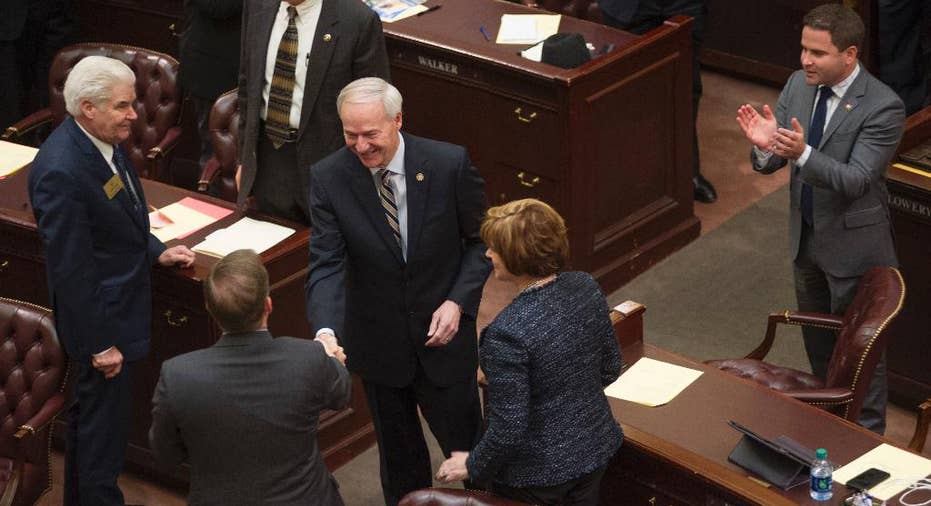States can offer a lesson as GOP proposes deep cut taxes

LITTLE ROCK, Ark. – President-elect Donald Trump and congressional Republicans who have pledged to cut federal taxes to boost the economy might consider looking first at lessons learned in GOP-controlled states that adopted similar strategies, only to see growth falter and budget gaps widen.
The situation is worrisome enough in Kansas, Oklahoma and Indiana that lawmakers are now debating whether to reverse course and raise taxes. And political leaders in states that have seen expanded Republican control, such as Arkansas and Iowa, are signaling caution about any new tax-cut proposals.
"It does not take a Ph.D. in economics to know that we can't say yes to every spending need, and we should also not say yes to every tax-cut idea," Arkansas Gov. Asa Hutchinson warned late last year.
The reforms show that tax changes always carry an element of uncertainty — about the economy, government needs and even the prices of commodities such as oil. Although the federal and state tax systems are significantly different, both are subject to forces beyond lawmakers' control.
A recent Associated Press survey found that more than half of the states — 33 — are currently dealing with a budget shortfall or expect to confront one in the coming fiscal year. Experts say state economic growth has been slower than expected, with revenue in some places failing to meet projections or keep up with rising spending needs.
Hutchinson, who took office vowing to slash income taxes, has proposed a much more modest cut of $50 million annually for low-income taxpayers. Meanwhile, a top Arkansas GOP lawmaker has said any tax-cut ideas may have to be set aside for a few years until the state's financial picture improves. State revenue is running $8.8 million behind projections for the fiscal year.
After Indiana Republicans cut income, corporate and property taxes, the state developed a $300 million budget gap. GOP lawmakers are now pushing a plan to raise gasoline taxes and adopt a new registration fee for motorists to help pay for road improvements. Critics say the effort is simply shifting the tax burden from the wealthy to everyone else.
"This is going to be the first session I remember coming into that the Republicans are advocating for tax increases," said Senate Minority Leader Tim Lanane, a Democrat. "At the same time, we're continuing to give tax breaks to corporations and businesses. How are they going to explain that?"
In Kansas, lawmakers have struggled to balance the budget since they slashed personal income taxes in 2012 and 2013 at the urging of Republican Gov. Sam Brownback. The state has faced economic pressures related to a decline in agriculture and oil prices, but the broad-based tax cuts are viewed largely as an unsuccessful effort to stimulate the economy.
Lawmakers are now debating their third tax increase since the cuts were passed, with the state facing projected shortfalls of $1.1 billion through June 2019. The Brownback administration has proposed higher taxes on certain business owners, cigarettes, beer and liquor. Other plans include diverting highway money to general government programs, scaling back contributions to the pension program for public employees and liquidating a $317 million investment fund.
Brownback's budget director, Shawn Sullivan, warned of dire consequences if the proposals are not approved.
"You're left with huge tax increases or huge (budget) cuts," Sullivan said. "Even the mix between the two is huge."
Whatever happens in Washington is likely to affect state budgets in some way. That gives lawmakers another reason to move cautiously.
A congressional tax overhaul could eliminate key exemptions benefiting state and local governments. At the same time, the promise by Trump and congressional Republicans to repeal the Affordable Care Act would probably reduce the amount of federal money sent to states. In New York alone, repealing the health care law would cost the state an estimated $3.7 billion in federal funding, or roughly 2.5 percent of the state budget.
A House tax plan would reduce federal revenue by $3 trillion in the first 10 years, while Trump's plan would cut revenue by $9.5 trillion over the same period, according to the nonpartisan Tax Policy Center. Trump has disputed the analysis.
Previous tax cuts are not the only reason for downbeat budget forecasts.
In Democrat-dominated California, where voters approved tax increases and state revenue has soared in recent years, Gov. Jerry Brown is warning of a possible $1.6 billion shortfall.
Medicaid costs are contributing to budget gaps in Massachusetts, Maryland, Mississippi, New York and Rhode Island. Other states are dealing with increasing spending demands in education and health care.
Energy-producing states such as Oklahoma, Alaska and New Mexico have struggled in part because of a decline in oil and natural gas prices.
Oklahoma's budget woes were deepened by a reduction in the top individual income tax rate that took effect just as the state's economy began to contract amid lower oil and natural gas prices. Three straight years of budget shortfalls were closed largely with cuts to state agencies. Now the Republican governor and GOP-controlled Legislature are considering raising taxes on cigarettes, gasoline and some services to help fill an $870 million budget hole.
The state Department of Human Services has slashed about 1,200 non-child welfare positions to deal with the falling revenue.
"Every time the government wants to cut," said Marcellius Bell of Oklahoma City, who serves as legal guardian for three adults with severe developmental disabilities, "it seems like they cut services to the disabled, the veterans and the nursing homes."
___
Cassidy reported from Atlanta. Associated Press writers John Hanna in Topeka, Kansas; Sean Murphy in Oklahoma City; Stephen Ohlemacher in Washington, D.C.; and Brian Slodysko in Indianapolis contributed to this report.
___
Follow Christina Almeida Cassidy on Twitter at http://twitter.com/AP_Christina and Andrew DeMillo at www.twitter.com/ademillo.



















